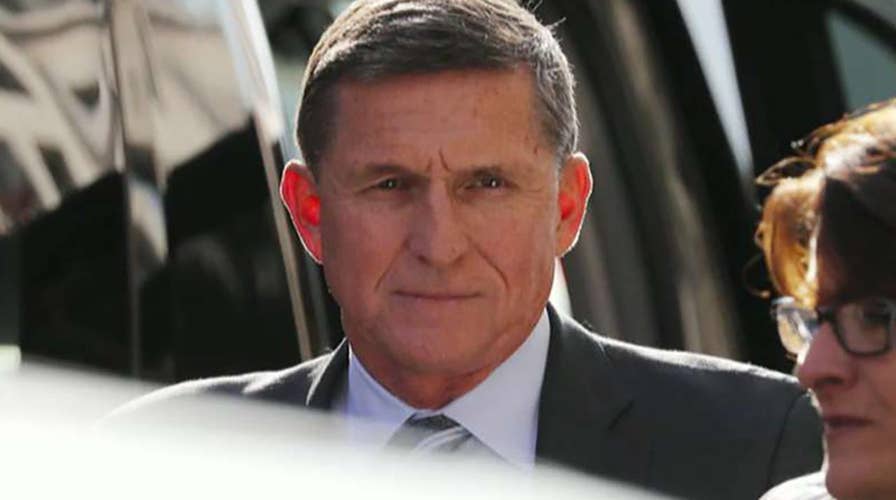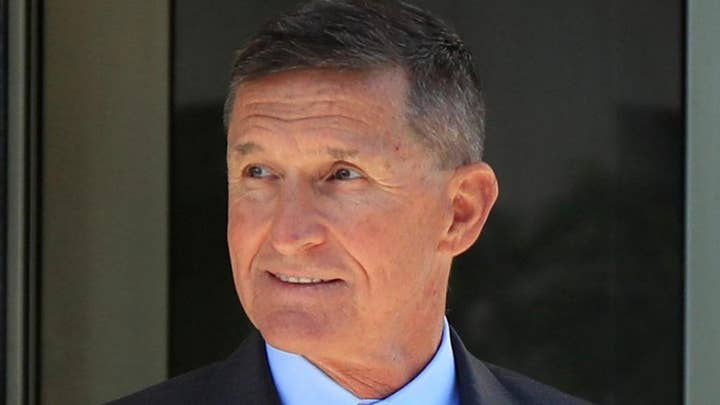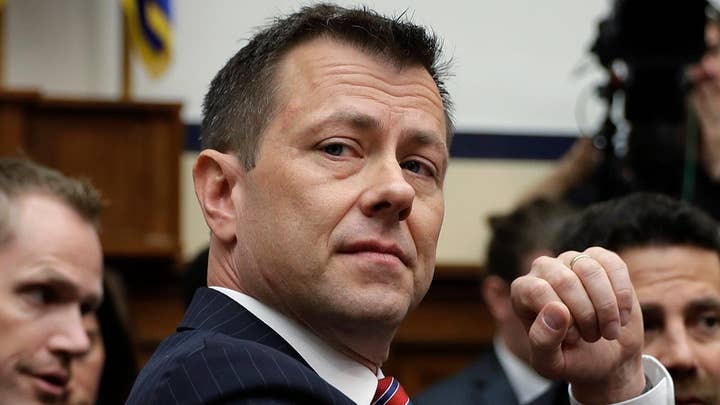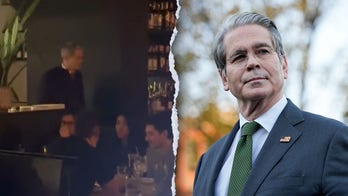Flynn hearing canceled after brief allegedly reveals FBI manipulated interview records
Judge Andrew Napolitano breaks down the 'bizarre twist and turns' in the case against the former national security adviser.
Michael Flynn's lawyer on Monday demanded in a court filing that the FBI thoroughly search its internal "Sentinel database" and turn over "every" document in which agents described their critical January 2017 White House interview with the former national security adviser, after it emerged last month that FBI officials had apparently manipulated the so-called "302" witness report in the case weeks after the interview.
Flynn's attorney, Sidney Powell, also asserted that separate handwritten notes from the interview drafted by since-fired FBI agent Peter Strzok and another agent are plainly inconsistent with one another, as well as the final FBI 302 that underpinned Flynn's guilty plea for one count of making false statements to investigators.
The handwritten notes were produced last week by prosecutors, who called Flynn's claims that he was tricked into the guilty plea "demonstrably false."
Although the government has insisted that the FBI's after-the-fact edits to the 302 report were "largely grammatical and stylistic," Powell argued that they were in fact highly substantive and improper alterations that inaccurately made it appear that Flynn had issued blanket denials to agents' questions.
Powell noted in the filing that she will file a motion seeking to have the case against Flynn thrown out because of "egregious government misconduct." Most courts agree that the Supreme Court "would find that the government has an obligation to disclose exculpatory evidence at the plea stage," Powell wrote, adding that the government had deliberately manipulated its witness reports to secure a guilty plea.
In the meantime, Powell argued there was no excuse for the FBI not to immediately produce the comprehensive "redaction history, audit trail, and metadata" for the Flynn 302, which the Sentinel system should automatically maintain.
"The FBI Sentinel system can retrieve any draft," Powell wrote. "Drafts are numerically serialized when placed in the system. Those numbers—apparently redacted from the 302 drafts that have been produced—would probably provide further information."
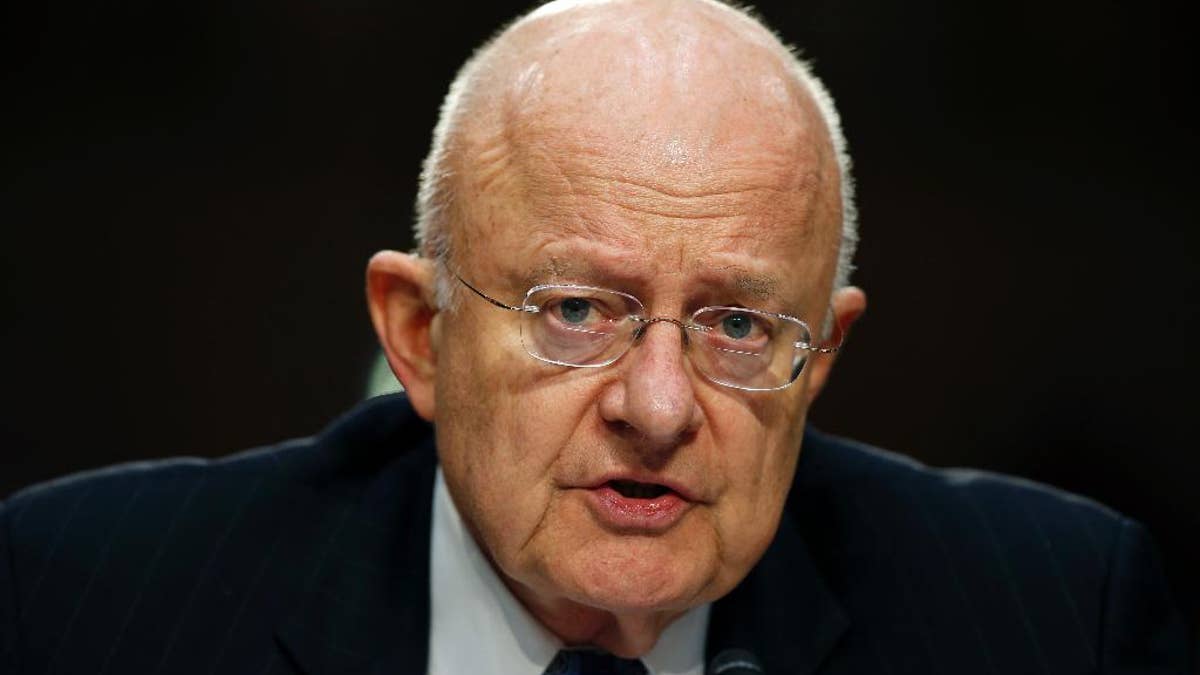
Obama administration Director of the National Intelligence James Clapper told a reporter to take the "kill shot" on Michael Flynn, newly revealed text messages show. (AP Photo/Alex Brandon, File) (The Associated Press)
The government has argued the 302 report shows that Flynn lied to Strzok and another agent concerning his communications with Russia's ambassador on two matters: a United Nations vote on Israel, as well as the Obama administration's sanctions against Russia.
But, just a day before the fateful Jan. 24, 2017 Flynn White House interview, The Washington Post ran a story based on multiple U.S. intelligence sources openly stating that the FBI had wiretapped Flynn's calls with the Russian ambassador, reviewed them, and found no wrongdoing.
And the handwritten notes from both Strzok and the other agent indicated they did not detect any physical signs that Flynn was lying to them, Powell observed -- frustrating agents' allegedly "pretextual" efforts to trap Flynn, who had made powerful enemies in Washington under the Obama administration, on a process crime.
FORMER DNI CLAPPER TOLD REPORTER TO TAKE 'KILL SHOT' ON FLYNN
Powell's main jumping-off point in Monday's filing was the newly revealed text messages between Strzok and former FBI lawyer Lisa Page, which revealed that Page -- who was not present for the Flynn interview -- had apparently made "edits" to the 302 report. Page told Strzok on February 10, 2017 that she “gave my edits to Bill to put on your desk.”
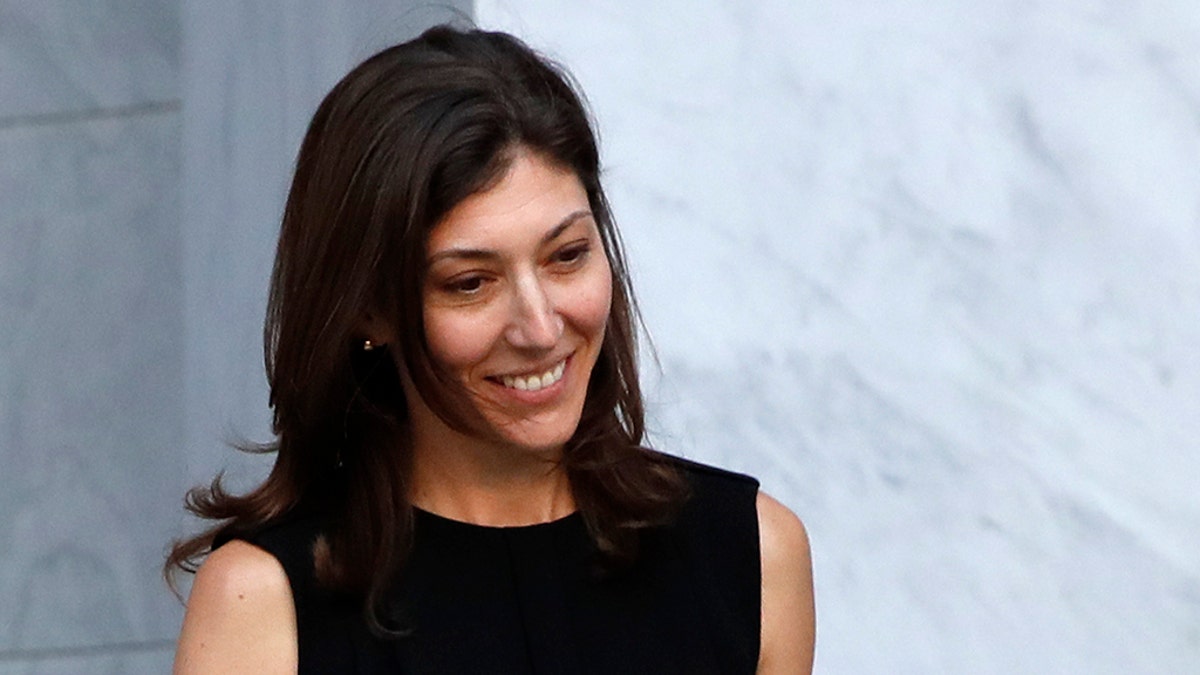
Former FBI lawyer Lisa Page leaves the Rayburn House Office Building after a closed doors interview with the House Judiciary and House Oversight and Government Reform committees, Friday, July 13, 2018, on Capitol Hill in Washington. (AP Photo/Jacquelyn Martin)
Later that day, "Strzok went into the office, picked up Page’s edits, and made changes that any reasonable person would deem material to the 302," Powell wrote.
Specifically, Strzok "added a definitive statement," asserting in the 302 report that "Flynn stated he did not" ask the Russian ambassador to vote a certain way on a United Nations resolution concerning Israel.
"This is materially different from the notes which state Flynn did not recall speaking to Kislyak on the UN vote issue," Powell wrote.
Separately, Powell asserted that the 302 was altered to indicate that Flynn had answered "no" when asked if the Russian ambassador "described any Russian response to a request by Flynn." But, Strzok's contemporaneous notes do not mention a "Russian response" at all, Powell observed.
Adding insult to injury, Powell alleged, the handwritten "notes bear no signature and date as required by the FBI, casting doubt on their authenticity."
"If the signatures and dates are present in the originals, the government has unjustifiably redacted that information, possibly without leaving a black mark to disclose a redaction, which itself is a form of deception," she wrote in the filing.
The FBI has argued that an apparently missing version of the Flynn 302, drafted before February 2017, did not need to be produced because “there is no reason to believe it would materially differ” from material provided to Flynn's legal team. But, Powell wrote, the law on intentional or unintentional evidence spoliation, or destruction, is clear, and "requires the assumption that the evidence is favorable to the defense."
Further, the notes that have been provided "do not say that [Flynn] made any false statement at all," Powell continued. "The agents reported back believing he either was honest or believed he was telling the truth. There is nothing in the 302s—draft or final—that says he made false statements. And, the notes do not even match each other—especially on the statements regarding the UN vote and sanctions."
DURHAM INVESTIGATION INTO ORIGINS OF 2016 TRUMP CAMPAIGN SURVEILLANCE EXPANDS ITS SCOPE
Strzok has previously noted that he was primarily in charge of asking questions of Flynn, while the other agent handled contemporaneous notetaking. But, the government has since argued in court that both sets of notes were contemporaneously taken.
"Even a layman can look at the two sets of notes and discern that Strzok’s miniscule, printed, within-the-lines, longer, and more detailed notes bear none of the hallmarks of being written during the press of an interview—much less by the secondary note-taker," Powell fired back. "That observation is even more obvious when compared with Agent 2’s notes, which do appear to be contemporaneous."
Ordinarily, Powell noted, false statements cases arise "incidentally" when the FBI is questioning suspects as part of an investigation. But in this case, FBI agents at the direction of then-FBI Deputy Director Andrew McCabe broke their normal procedure to question McCabe at the White House concerning his wiretapped calls with the Russian ambassador.
(McCabe and Flynn have a personal history, and the Obama administration fired Flynn in 2014, later warning the Trump administration not to hire him.)
"Here, to use [former FBI agent Peter] Strzok’s own words, the investigation was 'a pretext,'" Powell wrote. "The object of the interview was to secure, rather than prevent, a 1001 [false statements] violation."
Former FBI Director James Comey admitted in an interview last year that he personally made the decision to send a pair of agents to interview Flynn in 2017, and acknowledged the arrangement was not typical for dealing with a White House official.
He called it “something I probably wouldn't have done or maybe gotten away with in a more … organized administration.”
According to Flynn's previous legal team, FBI agents in his case deliberately did not instruct Flynn that any false statements he made could constitute a crime, and decided not to "confront" him directly about anything he said that contradicted their knowledge of his wiretapped communications with the Russian envoy.
Representatives for Strzok and Page did not immediately respond to Fox News’ request for comment.
Powell’s filing is just the latest in a series of motions brought to the court on behalf of Flynn. Last month, Powell demanded federal prosecutors turn over two cellphones used by Maltese professor Joseph Mifsud, whose role in the Trump-Russia investigation has long been shrouded in mystery.
CLICK HERE TO GET THE FOX NEWS APP
Powell’s defense of Flynn has caused an escalating battle with the government, with Flynn’s sentencing still up in the air for his guilty plea. The government said in late August that the case was ready for sentencing, after months of delay. U.S. District Judge Emmet Sullivan has set a Dec. 18 sentencing date, though it’s unclear whether it could be pushed off again.
Fox News' Brooke Singman contributed to this report.




















